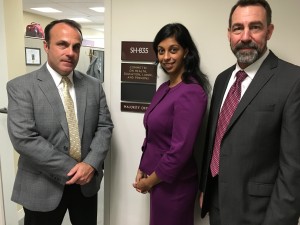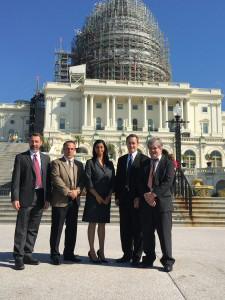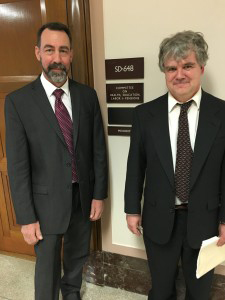On October 21-22, SfRBM leadership held 12 meetings on Capitol Hill in Washington D.C. to introduce key Congressional offices to the society and discuss important issues impacting members, including increased NIH funding, diversity and public engagement in science.
 SfRBM met with senior staff of the Senate Committee on Health, Education, Labor and Pension (HELP), which has jurisdiction encompassing most of the agencies, institutes, and programs of the Department of Health and Human Services including the NIH. SfRBM also met directly with Senator Chuck Grassley, Senator Joni Ernst, Congressman Dave Loebsack to name a few. One goal of these meetings was to build relationships between key Congressional offices and SfRBM. While SfRBM is a member of the Federation of American Society for Experimental Biology (FASEB), which does an amazing job raising awareness of legislation impacting the scientific community, they do not promote or raise awareness about SfRBM specifically.
SfRBM met with senior staff of the Senate Committee on Health, Education, Labor and Pension (HELP), which has jurisdiction encompassing most of the agencies, institutes, and programs of the Department of Health and Human Services including the NIH. SfRBM also met directly with Senator Chuck Grassley, Senator Joni Ernst, Congressman Dave Loebsack to name a few. One goal of these meetings was to build relationships between key Congressional offices and SfRBM. While SfRBM is a member of the Federation of American Society for Experimental Biology (FASEB), which does an amazing job raising awareness of legislation impacting the scientific community, they do not promote or raise awareness about SfRBM specifically.
 SfRBM leaders and staff who participated included Neil Hogg, Rick Domann, Sruti Shiva, Eric Kelley, Kent Lindeman and Brent Carney, the society’s communications and public affairs partner.
SfRBM leaders and staff who participated included Neil Hogg, Rick Domann, Sruti Shiva, Eric Kelley, Kent Lindeman and Brent Carney, the society’s communications and public affairs partner.
In talking to members of Congress about ways to increase NIH research funding, there was pledged support for this initiative, however no real solutions laid out for how to fund it. Congressmen James Sensenbrenner’s office indicated they would not vote in favor of any NIH bill that did not clearly identify the funding source. Senator Robert Casey’s office stated that the pharmaceutical industry, who benefits greatly from the bench science resulting from NIH funding, doesn’t seem to prioritize the importance of NIH funding to support this research when they are speaking with legislators.
 After meeting with the Senate HELP Committee, we came away with guarded optimism. The Committee is currently working on an “Innovation Bill” that will be the Senate companion to the 21st Century Cures Act which passed the House earlier this year. This bill will focus on three sectors, NIH research, FDA research and Health IT. While the bill is set to be introduced in the next couple weeks, making our visit extremely timely, it is unclear if it will contain increased funding for the NIH. Senator Patty Murray, in her role as Committee Ranking Member, indicated to us that such funding is a “must have” in the legislation.
After meeting with the Senate HELP Committee, we came away with guarded optimism. The Committee is currently working on an “Innovation Bill” that will be the Senate companion to the 21st Century Cures Act which passed the House earlier this year. This bill will focus on three sectors, NIH research, FDA research and Health IT. While the bill is set to be introduced in the next couple weeks, making our visit extremely timely, it is unclear if it will contain increased funding for the NIH. Senator Patty Murray, in her role as Committee Ranking Member, indicated to us that such funding is a “must have” in the legislation.
Overall, we were thrilled with the reception we received and the opportunity this gives us in the coming years. Given the timing of the legislation in the HELP Committee and the FY2016 budget, our visit couldn’t have come at a more pivotal time. As one of the benefits you receive as an SfRBM member, we feel this representation in Washington was extremely beneficial for our organization, its members and the issues so many of us hold dear. We look forward to continuing to build the relationships that were started in DC last week, to the benefit SfRBM members in future years.
Sincerely,
Neil Hogg, Ph.D.
Medical College of Wisconsin
SfRBM President
— Published
Category: Redox Biology
To Experienced Mentors,
 My principal investigator (PI) helped me with my writing, the postdocs in lab taught me bench science, and my fellow grad students helped me better communicate my science. I’m going to be in charge of training an undergrad on a project which will be an extension of my dissertation work. I’m excited, and my PI thinks I am ready for this responsibility, but I don’t know if I am going to be good at training as this is my first time as a science mentor. Should I be worried?
My principal investigator (PI) helped me with my writing, the postdocs in lab taught me bench science, and my fellow grad students helped me better communicate my science. I’m going to be in charge of training an undergrad on a project which will be an extension of my dissertation work. I’m excited, and my PI thinks I am ready for this responsibility, but I don’t know if I am going to be good at training as this is my first time as a science mentor. Should I be worried?
Sincerely,
A Nervous New Mentor
Dear A Nervous New Mentor,
First off, congratulations on taking this leadership role in your lab. Training freshmen scientists is one of the most important steps in maintaining the success of not only individual research programs, but scientific progress in general. That being said, training a new lab member as a graduate student or even a postdoc for the first few times can be challenging because rarely will you have someone providing constructive criticism as you employ your own method of training.
Even though this is your first time in a training position, know that your PI trusts you at this point in your career to be able to handle this responsibility. This is not to say there won’t be speed bumps and some additional demands on your already busy lifestyle. But that is where you can utilize your mentors’ help. Never be afraid to ask for advice from your PI and other colleagues who have had the opportunity to train new lab members. Use their advice to mold your own personal training strategy, and over time with trial and error you can improve your mentoring strategy. Even seasoned investigators sometimes have to modify the way they teach based on the available resources and personal characteristics of the trainee.
So to answer your question, don’t be worried. Instead, utilize your skills as a scientist to be observant and know that some hardships and failures may come up that you will have to find solutions to implement.
Sincerely,
An Experienced Mentor (who is still learning a few tricks)
— Published
Categories: Education, Redox Biology